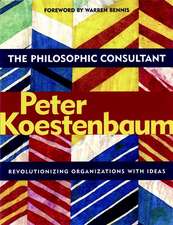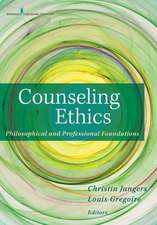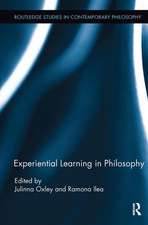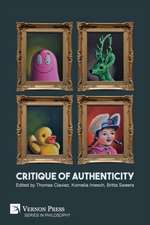Therapeutic Ethics in Context and in Dialogue: Advances in Theoretical and Philosophical Psychology
Autor Kevin Smithen Limba Engleză Hardback – 15 iun 2020
Psychotherapy helps one enact ideas about a good life, and therapists practice orientations rooted in their chosen approach. A 'good life' can therefore mean different things depending on the therapy. Building on the philosophy of Charles Taylor, Smith examines the link between therapy, ethics and the root of therapeutic views in comparison to modern, Western ideas about 'living well'.
This is one of two complementary volumes (the other being The Ethical Visions of Psychotherapy). This volume builds on the last to explore what it means to engage the different ethics of different therapies by offering a deeper explication of therapeutic ethics. Utilizing Taylor's work on practical reasoning, Smith explores topics like the nature of the ethical argument, the role of ethical intuitions and the value of framing ethical debate as ongoing dialogue. He applies this to therapeutics ethics to show how vital it is to consider the ethical proposals that are present in current theories and practices in order to understand the psychotherapies.
A key text for upper level undergraduate, postgraduate students and professionals in the field of psychotherapy, psychoanalysis, theoretical psychology and philosophy of the mind.
| Toate formatele și edițiile | Preț | Express |
|---|---|---|
| Paperback (1) | 185.02 lei 6-8 săpt. | |
| Taylor & Francis – feb 2022 | 185.02 lei 6-8 săpt. | |
| Hardback (1) | 333.12 lei 6-8 săpt. | |
| Taylor & Francis – 15 iun 2020 | 333.12 lei 6-8 săpt. |
Din seria Advances in Theoretical and Philosophical Psychology
-
 Preț: 198.45 lei
Preț: 198.45 lei -
 Preț: 152.78 lei
Preț: 152.78 lei -
 Preț: 356.63 lei
Preț: 356.63 lei -
 Preț: 187.34 lei
Preț: 187.34 lei -
 Preț: 385.79 lei
Preț: 385.79 lei -
 Preț: 152.42 lei
Preț: 152.42 lei -
 Preț: 178.53 lei
Preț: 178.53 lei -
 Preț: 137.40 lei
Preț: 137.40 lei -
 Preț: 187.90 lei
Preț: 187.90 lei -
 Preț: 185.02 lei
Preț: 185.02 lei - 22%
 Preț: 119.98 lei
Preț: 119.98 lei -
 Preț: 460.09 lei
Preț: 460.09 lei -
 Preț: 185.02 lei
Preț: 185.02 lei -
 Preț: 155.43 lei
Preț: 155.43 lei -
 Preț: 407.57 lei
Preț: 407.57 lei -
 Preț: 198.45 lei
Preț: 198.45 lei -
 Preț: 459.71 lei
Preț: 459.71 lei -
 Preț: 461.28 lei
Preț: 461.28 lei -
 Preț: 416.22 lei
Preț: 416.22 lei -
 Preț: 406.81 lei
Preț: 406.81 lei - 5%
 Preț: 389.25 lei
Preț: 389.25 lei - 16%
 Preț: 309.96 lei
Preț: 309.96 lei -
 Preț: 391.39 lei
Preț: 391.39 lei -
 Preț: 391.65 lei
Preț: 391.65 lei - 18%
 Preț: 1000.27 lei
Preț: 1000.27 lei - 9%
 Preț: 1003.52 lei
Preț: 1003.52 lei
Preț: 333.12 lei
Preț vechi: 391.73 lei
-15% Nou
63.74€ • 66.73$ • 52.74£
Carte tipărită la comandă
Livrare economică 05-19 aprilie
Specificații
ISBN-10: 0367480336
Pagini: 108
Dimensiuni: 138 x 216 x 13 mm
Greutate: 0.2 kg
Ediția:1
Editura: Taylor & Francis
Colecția Routledge
Seria Advances in Theoretical and Philosophical Psychology
Locul publicării:Oxford, United Kingdom
Public țintă
Postgraduate and ProfessionalCuprins
- Sources of Therapeutic Ethics and the Prospects for Dialogue
- Therapy Against Ethics and the Ethics of Therapy
- Therapeutic Ethics and Charles Taylor’s History of the Modern Identity
- From the Ethics of Therapy to Ethical Dialogue
References
Index
Notă biografică
Recenzii
"How can we better understand psychotherapy’s ethical visions when therapies—drawing on particular pictures of human flourishing—deny that therapy involves ethical visions? In this very perceptive book, Kevin Smith links psychotherapy’s ethical visions to the intuitions and stories told by therapist and client, to therapists’ gentle interrogation and "improvement" of clients’ ethical visions, and to the history of Western thought, in which Euro-American psychotherapy’s contemporary ethical visions are rooted, visions rooted so deeply and implicitly they may not even be recognized as ethical. To address the diversity of extant ethical visions, he encourages a deep level of respectful, open-minded conversation among differing views. Therapeutic Ethics in Context and in Dialogue provides invaluable resources for the crucial task of developing richer, more sophisticated understandings of therapeutic ethics." -- Alan Tjelveit, Professor of Psychology, Muhlenberg College, author of Ethics and Values in Psychotherapy
"All too often our contemporary landscapes, be they international, national, social, ethnic, or professional, are torn asunder by relentless divisiveness and claims of rightness and superiority. Among the varied approaches to psychotherapeutic efforts, while the diversity of disciplines could well foster mutual learning and maturation, far too often the advocates of these models collapse into divisiveness and competitions that impoverish our opportunities to learn from one another. In these two volumes, Kevin Smith places ethics at the heart of these professional debates, examining and critiquing the values that divergent models of psychotherapy hold, both explicitly and implicitly, arguing that each represents a practice that promotes a particular vision of the good life. As a psychotherapist often drawn quite passionately into taking sides in these theory wars, I found in Smith’s book a quiet, deeply resourced perspective that allowed me to take a more reflective stance with regard to both the differences and the commonalities of contemporary models of psychotherapy. These books will be of great value to practitioners, researchers, scholars and teachers who value the reflective practice of the art, the science, and the philosophies of psychoanalysis and psychotherapy." -- William F. Cornell, author of Self-Examination in Psychoanalysis and Psychotherapy
"Kevin Smith’s work is essential. Every single practitioner of psychotherapy should be familiar with Smith’s message, and should be aware of the issues it raises for their work, every moment of every day. Psychotherapy, Smith tells us, is not a technical exercise in the amelioration of problems. The aims and conduct of psychotherapy are not adequately described or measured in the terms of evidence-based practice. Every aspect of psychotherapy, from the way problems are defined to the means by which they are addressed, is an expression, often inadvertent, of what we believe makes life good. Psychotherapy of every variety is a social practice, and like all such practices, it promotes an ethic. Whether they are used to thinking of their work as an ethical endeavor or not, all psychotherapists spend their entire professional lives influencing those with whom they work to live in certain ways and not in others. Psychotherapists are far too little aware of what is, after all, the very (ethical) ground under their feet.
Smith’s two books should be assigned in every psychotherapy training program, and should be required reading for those who have finished formal training, regardless of their theoretical orientation (yes, I do mean to include the entire spectrum, from psychoanalysis to CBT) or the profession of its matriculants. Psychologists, psychiatrists, social workers, counselors, clergy, psychiatric nurses, marriage and family therapists—all really do need to think through the issues presented here." -- Donnel B. Stern, Ph.D., William Alanson White Institute, author of The Infinity of the Unsaid
Descriere
Psychotherapy helps one enact ideas about a good life, and therapists practice orientations rooted in their chosen approach. A 'good life' can therefore mean different things depending on the therapy. Building on the philosophy of Charles Taylor, Smith examines the link between therapy, ethics and the root of therapeutic views in comparison to modern, Western ideas about 'living well'.
This is one of two complementary volumes (the other being The Ethical Visions of Psychotherapy). This volume builds on the last to explore what it means to engage the different ethics of different therapies by offering a deeper explication of therapeutic ethics. Utilizing Taylor's work on practical reasoning, Smith explores topics like the nature of the ethical argument, the role of ethical intuitions and the value of framing ethical debate as ongoing dialogue. He applies this to therapeutics ethics to show how vital it is to consider the ethical proposals that are present in current theories and practices in order to understand the psychotherapies.
A key text for upper level undergraduate, postgraduate students and professionals in the field of psychotherapy, psychoanalysis, theoretical psychology and philosophy of the mind.







